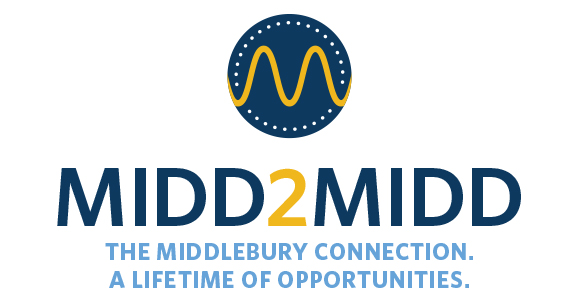
Thanks for taking the time to speak with us. We want to start by getting to know more about your new book “That Will Never Work”. You started the book by saying that it is not a documentary but a memoir. What motivated you to write a memoir 17 years after you left Netflix? What are your biggest takeaways during the process of writing? Originally, this was envisioned to be a self-help book. What was at the heart of the project was a lot of things I learned at Middlebury as a MIDDCORE mentor. In the process of working with so many undergrads with great ideas, not necessarily just related to business but also social entrepreneurship, I was reminded of lessons passed down to me from my dad about success. I realized that all these tips I learned over these years were not just applicable for people going into business, but for anyone having a dream and making it become a reality.
This is not a business book; this is a life book. I wanted to lay out these tips with stories from my time at Netflix, but my editor recommended centering it on the stories. People will pick up on the tips from seeing how I used them and not being hammered over the head with them. At the same time, I wanted people to get the honest story of founding Netflix and realize what really goes into starting a company.
It took me 16 years after retiring from Netflix to write the story because it usually takes distance to understand your role in any situation. Having a company has huge elements of risk and luck. You can’t understand this immediately. I had to think of what worked as a consequence of what I did versus plain old luck. By taking a step back, I was able to be more honest about my role and find lessons I could take away from my experiences.
In your book you encouraged people to persist even if others tell you that your idea would never work. Yet you also mentioned the importance of being flexible to move onto new ideas (before Netflix, you came up with the idea of personalized shampoos). How do you suggest that students reconcile these two equally valuable perspectives? Even though you’ll always hear that it will never work, the lesson here is that nobody knows. No one knows if an idea is good or bad in advance. You’ll find that any advice you get will be wrong. Stop trying to ask people if your idea is good or not. Stop researching and find a cheap and easy way to get your idea out into the real world. That is the only way to see if your idea will actually work. If the market says your idea will work, that’s the validation you need. Fundamentally ideas don’t count for anything—they’re just starting points. Just do it.
What would you say to your mentees if you think their ideas would not work? I would just tell them it’s a terrible idea. It’s an amazing formula to tell people the truth and see how much they will like it. Interestingly, most mentees don’t get that feedback. Even in a professional setting such as pitching an idea to a venture capital, people won’t say it’s a bad idea. There’s no real incentive for anyone to give bad news. I don’t believe you should always stick to your ideas—I denounce that. What you want to stick with and fall in love with is the problem. The more you fail and learn, the more things you can test to solve the problem.
We know you have been a great mentor to Middlebury students through MIDDCORE. What motivated you to become a mentor at MIDDCORE? What was your most memorable experience with Middlebury students? Two of my kids went to Middlebury and I was asked if I was willing to mentor at MIDDCORE with my entrepreneurial background. At MIDDCORE, I taught students how to validate their ideas, I also taught them how to transform an idea into action.
I was always shocked about the amount of good ideas coming from Middlebury students. I remember one time, we were working in small groups, peer-reviewing each other’s ideas. Everyone in the room was really active but there was someone completely intimidated by the program. She even wanted to leave the program at one point. But after brainstorming, she had a revelation and fleshed out a tremendously good idea. It was both exciting and gratifying to see that transformation, which proves that anyone can come up with solid ideas.
How do you select your mentees? What are the qualities shared by your best mentees? From the student perspective, especially from elite schools such as Middlebury, mentorship becomes a competition. “I’m doing my internship at Blackrock” competes with “I’m doing my internship at Goldman.” My first piece of advice is to humble yourself. There is a simple way in finding mentorship: find the smartest people you know and do everything they say. You’ll learn way more than any job training by following them in their everyday lives.
I’m looking for someone who has two traits: entrepreneurial spirit and good listening skills. It’s difficult to find these two skills in the same person. There’s a small set of people who recognize they can inform their judgement by listening to others while still making their own decisions. That is an amazingly powerful combination of skills I’m always looking for.
What advice would you give to students/new graduates feeling paralyzed in their career exploration during the current Coronavirus pandemic? There are a lot of companies in a world of hurt right now. But part of being entrepreneurial is dealing with what you’re facing, as unexpected as it may be. Everyone is in the same boat right now. However, this favors the individuals and businesses who are willing to hustle to step forward. To the person who’s always had a predictable path, this will be very difficult. To the person who thrives in chaos, many new opportunities will come forward. Similar to the advice I’m giving to everyone else, take this time to start something new.
What do you think are the opportunities for entrepreneurial students during the current Coronavirus pandemic? Start something. Do a side hustle. Test something. This is an incredible time to start something new. Take advantage of this unique window where everyone is a starter. Go out and do something on the side that will let you be a businessperson on your own.
I don’t want to be naive; I know many people feel stalled by the current situation. But you should think of seizing the unexpected opportunities that have been created. I don’t want to use too many Silicon Valley analogies, but when companies are hiring an engineer or developer, they don’t really care about your education. They’ll ask, “What’ve you built in the past year?” This also applies to other industries like finance. Use this chance to do something. Be that person.
This article was written by Arturo Simental. If you are interested to interview alumni and contribute to this series, please contact Xiaoli Jin on Midd2Midd.

This series is coordinated by Xiaoli Jin ’19. Look for more alumni profiles each week. You can connect with Xiaoli on LinkedIn.
If you are interested to interview alumni and contribute to this series, please contact Xiaoli Jin 2019′ on Midd2Midd.

In this time of social distancing, we are all looking for new ways to stay connected, and Midd2Midd is one of them! Midd2Midd connects Middlebury students, alumni, and parents, supporting mentoring, networking, and engagement within the Middlebury community around the world. Midd2Midd is your place to make things happen. Simply complete your profile, create a customized search, and begin to network!